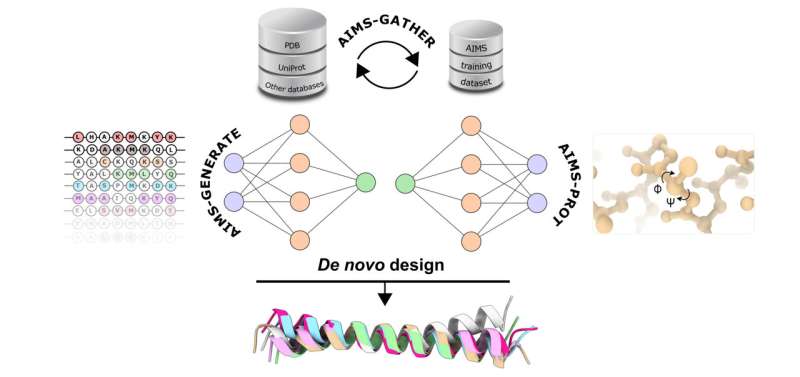This article has been reviewed according to Science X's editorial process and policies. Editors have highlighted the following attributes while ensuring the content's credibility:
fact-checked
peer-reviewed publication
trusted source
proofread
Method accelerates the development of sustainable biomaterials from years to minutes

A study, published in Advanced Materials on May 6, 2024, led by VTT's researchers, introduces a transformative approach that integrates synthetic biology with advanced machine learning and computational techniques to significantly accelerate the development of new biomaterials.
"By leveraging the power of AI and synthetic biology, we have managed to fine tune and dramatically speed up the design process of new protein-based materials, allowing for the rapid development of biomaterials with tailored functionalities, achieving what used to take years in just months, with the potential to further reduce this time to minutes," says Pezhman Mohammadi, VTT's senior research scientist and the head of the study.
By utilizing machine learning algorithms, VTT's research team was able to efficiently sift through thousands of protein structures to pinpoint the most promising candidates for laboratory synthesis.
Accelerating high-demand applications, such as smart materials
The new high-performance, protein-based biomaterials developed through this method are expected to replace fossil-based materials and bring game-changing properties for high-demand applications, such as medicinal injectables and smart materials to name a few. The research showcased the effective use of hybrid biomimetic and de novo design strategies, combining insights from nature's own design capabilities to create innovative materials from scratch.

"Synthetic biology enables production of complicated structures present in nature. Through this approach, we are not only replicating the extraordinary properties of natural materials but also enhancing them to meet specific functional needs, going one step beyond the evolution. The ability to quickly produce materials with customized properties opens new horizons for innovation in biotechnology and materials science," says Pezhman.
The publication in Advanced Materials marks a significant milestone in the multidisciplinary field of material biotechnology and showcases the potential of integrated sciences in solving complex global challenges.
The research team, including collaborators from VTT, the Polish Academy of Sciences, Temple University, Nanyang Technological University and Aalto University, brings diverse expertise in biology, chemistry, physics, data science, machine learning, AI and computational science. Together, they continue to refine these innovative techniques and expand their applications in the near future.
"As we move forward, we envision that the fusion of biotechnology, biorefinery processes, automation, synthetic biology, as well as the pivotal roles of machine learning and AI—all underpinned by biointelligence—will dramatically transform manufacturing.
"This comprehensive approach enables the rapid, precise design and production of biomaterials, leveraging automation to streamline and scale operations efficiently. Convergence of all these technologies not only accelerates innovation but also enables a radical shift towards more customized, sustainable production methods across various sectors, which offer tailored solutions with minimal environmental impact, revolutionizing industry practices," says Pezhman.
The study, titled "Accelerated Engineering of ELP-Based Materials through Hybrid Biomimetic-De Novo Predictive Molecular Design," demonstrates how the collaboration of experts from diverse fields, including synthetic biology, artificial intelligence, molecular dynamics simulation and more, has led to the creation of new biomaterials that are both sustainable and highly functional.
More information: Timo Laakko et al, Accelerated Engineering of ELP‐Based Materials through Hybrid Biomimetic‐De Novo Predictive Molecular Design, Advanced Materials (2024). DOI: 10.1002/adma.202312299
Journal information: Advanced Materials
Provided by VTT Technical Research Centre of Finland



















